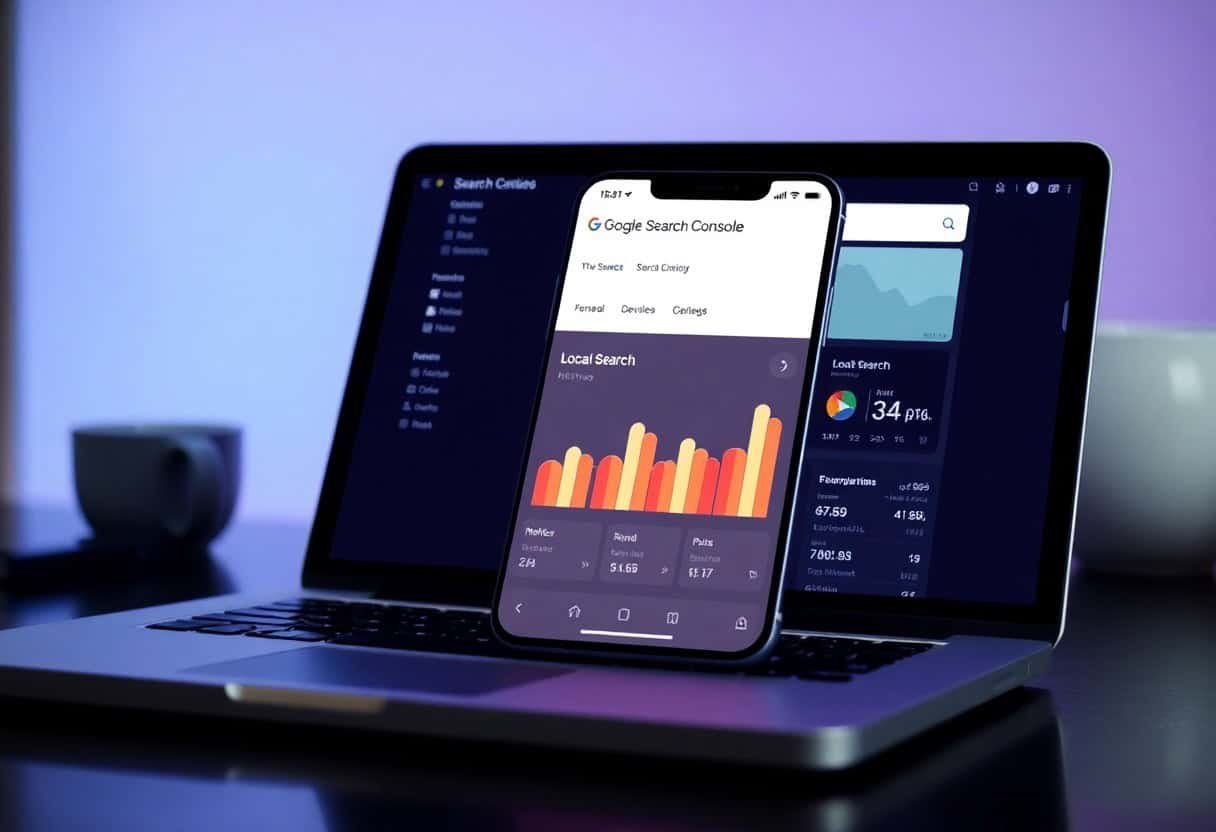Most local businesses strive to improve their visibility in search results, and Google Search Console can play a pivotal role in this process. By utilizing its features, you can monitor your website’s performance, understand how users find your site, and identify opportunities to enhance your local SEO strategy. You’ll gain insights into search queries relevant to your business, track your local rankings, and diagnose issues that might hinder your online presence. Leveraging Google Search Console effectively can lead to increased traffic and better engagement with your local audience.
Key Takeaways:
- Google Search Console provides insights on local search performance and impressions to improve visibility.
- Using location-specific keywords in website content helps enhance local search rankings.
- Monitoring indexing issues and mobile usability can boost overall user experience and local engagement.

Unlocking Local Insights: Leveraging Google Search Console Data
Utilizing Google Search Console (GSC) can transform your approach to local SEO by uncovering valuable data tailored to your geographical market. The platform provides insights into local search trends, user behavior, and performance metrics specific to your area, enabling you to fine-tune your strategies. By analyzing this data, you can optimize your website content and enhance your visibility in local search results, ultimately driving more foot traffic and online engagement.
Analyzing Location-Based Performance Metrics
Your GSC report offers a wealth of location-specific performance metrics that help you understand how well your site ranks in local searches. By filtering data by geographic location, you can identify which areas deliver the most traffic and engagement. This information allows you to target your marketing efforts more effectively, tailoring your content and outreach strategies to better meet the needs of your local audience.
Understanding Queries and Impressions in Local Searches
Examining queries and impressions offers critical insights into how users in your area search for products or services. GSC enables you to view which keywords lead to impressions and clicks, helping you understand local user intent. An optimized approach based on this understanding will align your offerings with local demand, ensuring higher visibility and relevance in search results.
Analyzing queries and impressions in local searches reveals what potential customers are specifically looking for in your area. For example, data might show that “best pizza near me” frequently leads to significant impressions but low click-through rates for your site. This signals an opportunity to refine your keyword strategy, perhaps by optimizing your content to capitalize on local preferences and trends, thus enhancing your chances of being clicked on in relevant searches. Understanding this dynamic enhances your ability to meet the needs of your community and improve your overall local SEO performance.
Optimizing Your Local Presence: Actionable Strategies
Focusing on actionable strategies can enhance your local presence effectively. Begin by ensuring your business information is consistently updated across all platforms, including your website and local directories. Claim and optimize your Google My Business profile, highlight customer reviews, and utilize local keywords throughout your content. Engage your audience with local events and community involvement, and periodically assess your local SEO performance using metrics and analytics to refine your strategies further.
Enhancing Local Listings through GSC Recommendations
Google Search Console provides valuable recommendations to enhance your local listings. By analyzing your performance data, you can identify areas for improvement, such as optimizing business descriptions, selecting relevant categories, and ensuring your contact information is accurate. Following these recommendations boosts visibility in local search results, making it easier for potential customers to find you.
Utilizing Search Analytics to Fine-Tune Local Content
Your local content can significantly benefit from insights gleaned through search analytics. Analyzing which local search queries bring visitors to your site helps you tailor your content to meet the needs and interests of your target audience more effectively. You can discover relevant local keywords, understand user behavior, and gauge which pages perform best, allowing you to create targeted, engaging content that resonates with your community.
For instance, if analytics show that users frequently search for “best coffee shops in [your location],” you could create blog posts featuring local coffee spots or highlight community events. Adjusting your content strategy based on actual data leads to better engagement and higher visibility in search results. Moreover, consistently updating your content with trending local topics can keep your audience informed and connected, helping to establish your brand as a local authority.
Bridging the Gap: Google Business Profile and Search Console Synergy
Integrating Google Business Profile (GBP) with Google Search Console (GSC) creates a powerful synergy for enhancing local SEO. By combining insights from both platforms, you can refine your local strategy, improving visibility and engagement. GSC provides data on search performance, while GBP showcases vital business information and customer interactions. Together, they enable you to target relevant keywords effectively, track user behavior, and optimize your profile for maximum impact in local searches.
Aligning GSC Insights with Google Business Profile Optimization
Aligning GSC insights with your Google Business Profile optimization is vital for drawing actionable conclusions. The data from GSC, such as search query performance and click-through rates, can guide you in adjusting your GBP content. Focus on incorporating high-ranking keywords into your business description and services, ensuring these elements are not only optimized for search engines but also resonate with potential customers.
The Impact of Reviews and Ratings on Search Performance
Reviews and ratings significantly influence your search performance, affecting both visibility and consumer trust. Positive reviews enhance your GBP ranking, making your business more likely to appear in local search results. Additionally, an increase in the quantity and quality of reviews not only boosts your credibility but also encourages more clicks and engagement, ultimately driving traffic to your website.
Statistics indicate that 88% of consumers trust online reviews as much as personal recommendations, illustrating their profound impact on decision-making. A strong review profile can lead to higher rankings in local searches, with businesses showcasing a 4.0-star rating or higher typically experiencing increased visibility. Monitoring and responding to reviews through your GBP while leveraging GSC data can amplify your local SEO efforts and foster a positive online reputation, enhancing customer engagement and conversion rates.
Monitoring Competitor Factors: Using Search Console for Local SEO
Monitoring competitors through Google Search Console can provide valuable insights into their local SEO strategies. By examining their keyword performance and site metrics, you can identify opportunities and threats in your local market landscape. Tools within GSC like URL Inspection can help compare your page performance against local competitors, pinpointing areas to improve. This ongoing vigilance can enhance your content and overall local strategy.
- Track competitor rankings for local keywords.
- Analyze backlink profiles for new link opportunities.
- Identify competitors’ highest-performing pages.
- Monitor changes in local search visibility.
Any insights gained can bolster your local SEO efforts.
Identifying Competitors and Their Keyword Strategies
Start by pinpointing local competitors in your niche using GSC’s performance reports. These reports show you the keywords driving traffic to your site and highlight similar keywords from competing businesses. By analyzing this data, you can uncover the keywords competitors focus on, which can help you adjust your own strategy to capture more local searches.
Analyzing SERP Features and Local Listings
Examining SERP features and local listings through Google Search Console reveals how your business is positioned in comparison to others. You can see which features, such as local packs, reviews, or Q&A, are displayed for your targeted keywords. Knowing their placement can guide you in optimizing your content and profile to enhance visibility.
Delving deeper, tracking the ranking of your business versus competitors in local packs and other SERP features is necessary. For instance, if competitors frequently appear in the local 3-pack while your business doesn’t, it may be time to enhance your local citations or reviews. Noting which SERP features are most effective for your competitors also allows you to tailor your strategies based on successful tactics, directly contributing to improved local search performance.

The Future of Local Search Optimization: Trends and Predictions
Adapting to the evolving landscape of local search optimization demands an understanding of emerging trends and predictions. As technology advances, local search strategies will have to embrace new consumer behaviors and preferences. This involves integrating more visual content, leveraging AI-driven insights, and emphasizing voice search optimization to enhance visibility and engagement.
Predicted Changes in Google Search Algorithms
Future updates to Google search algorithms are anticipated to prioritize localized, user-centric content even more. Focusing on semantic search, AI relevance, and context will reshape how businesses rank, urging you to create dynamic and localized content that directly addresses user intent.
The Growing Importance of User Engagement Signals
User engagement signals are predicted to play a pivotal role in local search rankings. Metrics such as click-through rates, time on site, and interaction rate will significantly influence how search engines evaluate the quality and relevance of your content, determining your visibility in local searches.
Harnessing user engagement signals means driving meaningful interactions on your site, which goes beyond just attracting clicks. Incorporate compelling visuals, relatable content, and straightforward navigation to sustain user interest. For instance, businesses that implement interactive elements, such as polls or Q&A sections, see a notable increase in engagement metrics. Google interprets these as positive indicators of relevance, thus enhancing your local SEO standing. The focus is on fulfilling user needs effectively—creating a proactive approach to building lasting relationships with your audience.
To wrap up
Upon reflecting, leveraging Google Search Console can significantly enhance your local SEO efforts. By utilizing its tools, you can monitor your website’s performance, identify local search queries, and optimize for better visibility. Understanding how visitors interact with your site allows you to refine your content strategy and improve user experience. Additionally, addressing any issues reported can further boost your local rankings, ensuring that your business reaches the right audience effectively.
FAQ
Q: Can Google Search Console help improve my local SEO?
A: Yes, Google Search Console provides insights into how your website performs in local search results. You can track search queries that lead to your site and optimize your content based on local keywords.
Q: What local SEO features does Google Search Console offer?
A: Google Search Console offers features such as performance reports showing local search traffic, indexing status, and the ability to identify and fix issues that may affect your local rankings.
Q: How can I use Google Search Console to monitor my local search performance?
A: You can use the performance report to filter results by geographical location, analyze click-through rates, and assess how well your site ranks for local searches, helping you adjust your local SEO strategies accordingly.

